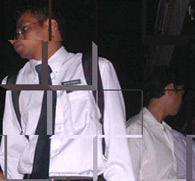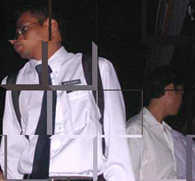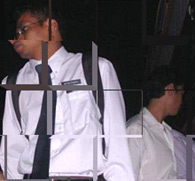Youths today have a hard enough time adjusting to school and schoolwork as it is. To make matters worse, by junior high and high school, they have to contend with confusing physiological changes, the adolescent horrors of spontaneous erections and unpredictable periods as well as the burning issue of their emerging sexuality.

For gay and lesbian youths, going to school is doubly treacherous. To most, it's like having to live through an entire hostile semester of Survivor where you get voted off just because you happen to be gay or lesbian.
Given that the typical school environment is one that is reinforced by heterosexism, there's nowhere else on earth where youths more constantly confronted with issues of sexual orientation and expected sexual norms: Girls are taught the joys of home-economics and the finer points of wearing a skirt while boys are introduced to rough team sports and notion of masculinity as defined by chasing skirts.
Consequently, boys attired in neatly pressed cardigans, standing with books clutched to their chests and discussing last night's episode of Beverly Hills 90120 featuring a topless Jason Priestly are often derided for being "different" or "orientationally challenged". Ditto too for girls with crew cuts, bound breasts, a comb in her pinafore and a walking style that would put John Wayne's western movie swagger to shame.
Haunted by cruel memories of being labeled "drama club fags" and "softball dykes", it is not surprising that most gay men and lesbian women would count their school days as being the most harrowing part of their homosexual existence.
Imagine having to put up with demeaning slurs and insults; imagine having to constantly change the pronoun when your classmates ask "Do you have a boyfriend/girlfriend?"; and then imagine not being able to share with anyone who you have a crush on or sadly, the person you really are inside. Multiply that by a factor of 365 and that's the amount of angst and anguish that confronts gay and lesbian youths on a daily basis.
In a study conducted by Parents and Friends of Lesbian and Gays (PFLAG), the findings suggest that youths today are not only coming out a far younger age, but that it might be getting safer for gay and lesbian youths to come out at school. Be that as it may, many gay and lesbian youths in Asia still find that homosexuality has still a long way to go from gaining social acceptance, especially in schools.
The most pressing problem facing gay and lesbian youths is the issue of their sexuality or more specifically, homosexuality.
While "normal" kids are expected to develop into phallically-controlled creatures or make-up slapping barbies, gay and lesbian youths have to grapple with issues of self-acceptance and be prepared for the immense anti-homosexual prejudice they would and are likely to face.

Anti-homosexual harassment and violence are particularly prevalent in schools and amongst teenagers. Intentionally or otherwise, the most common (and hurtful) way today for youths to disparage one another is to call a peer a "faggot", "lezzie" or "dyke".
Many effeminate boys and tomboys find themselves rejected, taunted and bullied by fellow classmates. To add fuel to the raging fire, teachers and administrators often turn their backs on these abuses, refusing to take reports of harassment or hold perpetrators accountable. In some instances, these figures of authority even encourage or participate in these abuses.
Recalls David who was often picked upon because of his soft-spoken and limp-wristed mannerisms: "I was singled out by the boys in my class and called "queer" and "sissy" as well as a host of other homophobic slurs just for being different. Sometimes these incidents happen in front of my teachers, yet no one did anything."
For Jesse, a student in a prestigious all-girls school in Singapore, the backlash of homophobia began when she unwisely told a friend she had a crush on her female basketball coach. After that unfortunate disclosure, she found herself shunned by her classmates to the extent that going into the girls' changing room became an ordeal. "It got to the point where they would whisper behind my back and refuse to change around me. Things got so bad that I had to go somewhere else to change."
In most cases, gay and lesbian youths who are just coming to terms with their sexual orientation find themselves isolated from a network of supportive peers and adults. Says Lee Lin, a closet lesbian: "There was no one in my school for me to talk to. I felt completely alone and unsupported. I felt like a freak because I feel and act different."
The lack of sympathy and support for gay and lesbian youths coupled with the general anti-homosexual atmosphere existing in schools often lead to a lack of self-esteem and self-worth for these youths. In the course of time, many gay and lesbian youths find themselves internalizing the prevailing anti-homosexual sentiments in school as well as in society, and as a consequent, tend to judge themselves too harshly.
As Hong Wee, a student in a co-ed school, explained: "I just began hating myself more and more as the hatred towards me grew and escalated from simple name-calling in elementary school to having persons in high school threaten to beat me up."
Jane, a Secondary 3 student, finds herself in a similar situation: "My classmates were all against me, constantly saying, "Oh, that's the lesbo" or "Are you the lesbo?". They're telling me all the time that I'm lesbian, like they're telling me that I cannot be anything else. And I couldn't even tell myself that I'm a lesbian. At times like these, I really hate myself and what I am."

In fact, a study released by the Human Rights Watch Group reveals that gay and lesbian youths often face so much bullying that it affects their emotional and physical health, not to mention their academic performance. It further alleges that some teens are bullied so often that they are barely able to get an education, with many suffering from chronic depression or dropping out of school.
Says Kevin Jennings who works for the Gay, Lesbian and Straight Educational Network (GLSEN): "If you teach young people that their lives have no value, they'll treat their lives like their lives have no value. They will do things that show that they don't really respect themselves, such as use drugs or attempt suicide or engage in unprotected sex."
To help gay and lesbian youths overcome social pressure, self-doubt and isolation, it is essential to let them know that they are not alone. If you are a teacher, support and validate your gay and lesbian students' feelings about their sexuality, assure them of your confidentiality and play an active role in challenging homophobia. If you have a gay or lesbian classmate, don't judge and don't label them. Instead, offer your friendship by accepting them for what they are and standing up for them when the going gets rough.
Finally, if you are a gay or lesbian student yourself, seek out classmates, friends or teachers who are gay or lesbian themselves or who accept your sexual orientation as being inconsequential to your friendship, or call the local gay hotline to seek advice or help.
Editor's note: As part of our focus on youth in the month of December, Fridae invites you to share your story about growing up as a gay teenager. Published letters will win 30 Fridae credits for use on our site.
